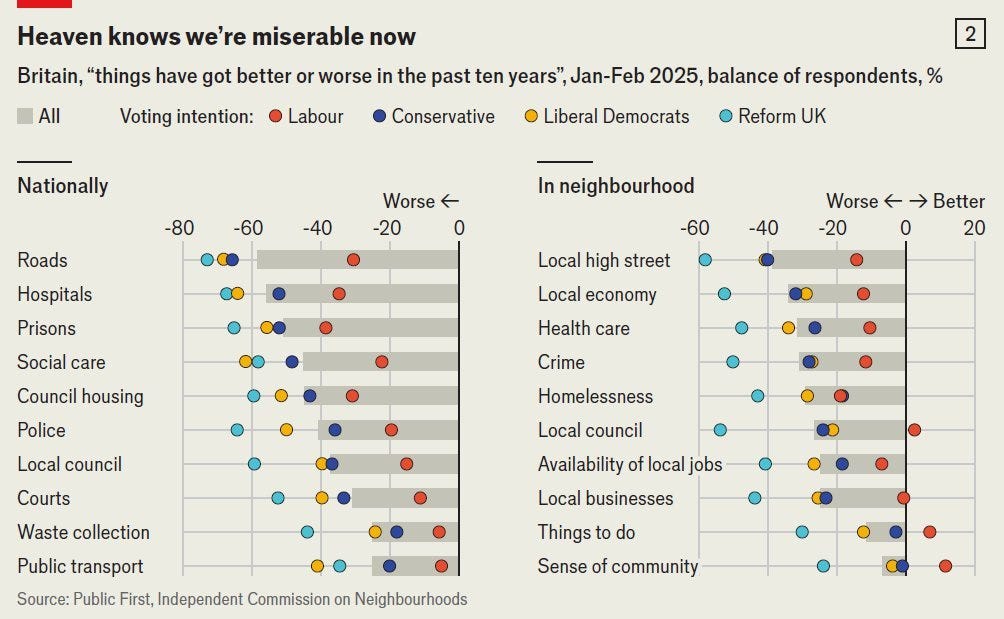Interessant3 #143 | 🇬🇧 Britain’s Triage, ⚛️ Lead to Gold, 👨🏫 Economist Jones
Three Interesting Things for W/C 2025-06-01
The posts for June will be released over the next couple days, with regular programming resuming from Sunday onwards.
1. Archie Hall – “Reflections on Britain’s Triage Ward”
🐕 A botched dog-theft case exposes the UK’s broken emergency response, with police unable or unwilling to coordinate basic inter-county action.
📉 Hall builds from this personal story to a broader diagnosis of Britain’s slow civic unraveling, describing a "triage-ward state" that only reacts to the direst crises.
🛠️ Charts reveal post-Covid stagnation in everything from ambulance wait times to driving-test backlogs, with the "Covid hump" never reversed.
🧩 Systemic dysfunction arises from layered failures: overloaded hospitals trap police officers, while broken IT systems block basic cooperation.
🧠 The conclusion is bleak but clear-eyed: the British state is brittle, overstretched, and stuck in reactive mode. Bold, imaginative reform is long overdue.
🔗 Reflections on Britain's triage-ward state – Archie Hall (The Economist)
2. CERN – “ALICE Detects Conversion of Lead into Gold at the LHC”
⚛️ At CERN’s ALICE experiment, lead nuclei colliding at near light speeds have been shown to eject protons in just the right quantities to momentarily form gold.
💡 This occurs during "ultra-peripheral" collisions, near misses that create brief but enormous electromagnetic fields, triggering nuclear reshuffling.
🧮 Detectors captured these events by counting tiny variations in emitted particles, distinguishing between outcomes like thallium, mercury, and gold.
⏱️ Run 2 of the LHC yielded about 29 picograms of gold, enough to make headlines but not jewellery.
🧠 More than a validation of alchemy, this helps physicists model nuclear fragmentation and improve predictions about beam loss in particle colliders.
3. Charles I. Jones – Curriculum Vitae
👨🏫 Stanford economist Chad Jones has quietly built one of the most compelling bodies of work in macroeconomics, focused on how innovation fuels long run growth.
📚 If you’ve ever wondered Why do economies grow in the long run? or why the richest countries today are vastly wealthier than 100 years ago, Jones’s papers are the best place to start.
📊 His 2016 piece "The Facts of Economic Growth" serves as an encyclopaedia of empirical truths in the field, laying out growth patterns, productivity gaps, and open questions with clarity and depth.
🌍 He raises fundamental challenges: How do institutions evolve? How do ideas spread across borders? Can we quantify the value of knowledge spillovers or the global impact of rising talent in countries like China?
🧠 Recent papers tackle AI’s existential risk, top income inequality, and the future of population and welfare, always with a focus on the intersection of data, theory, and long term thinking.
🔗 Curriculum Vitae – Stanford University
Join us next week for three more intriguing topics that challenge the norm and expand your horizons! ✌️
🌟 Sponsored by PopaDex
Discover a smarter way to securely manage your finances with PopaDex. Our platform automatically consolidates all your financial data into an intuitive interface, giving you a clear view of your net worth and empowering smarter budgeting and investment decisions. With advanced encryption and anonymisation, we prioritise your data privacy, ensuring secure storage and transmission.
Explore more at popadex.com.







